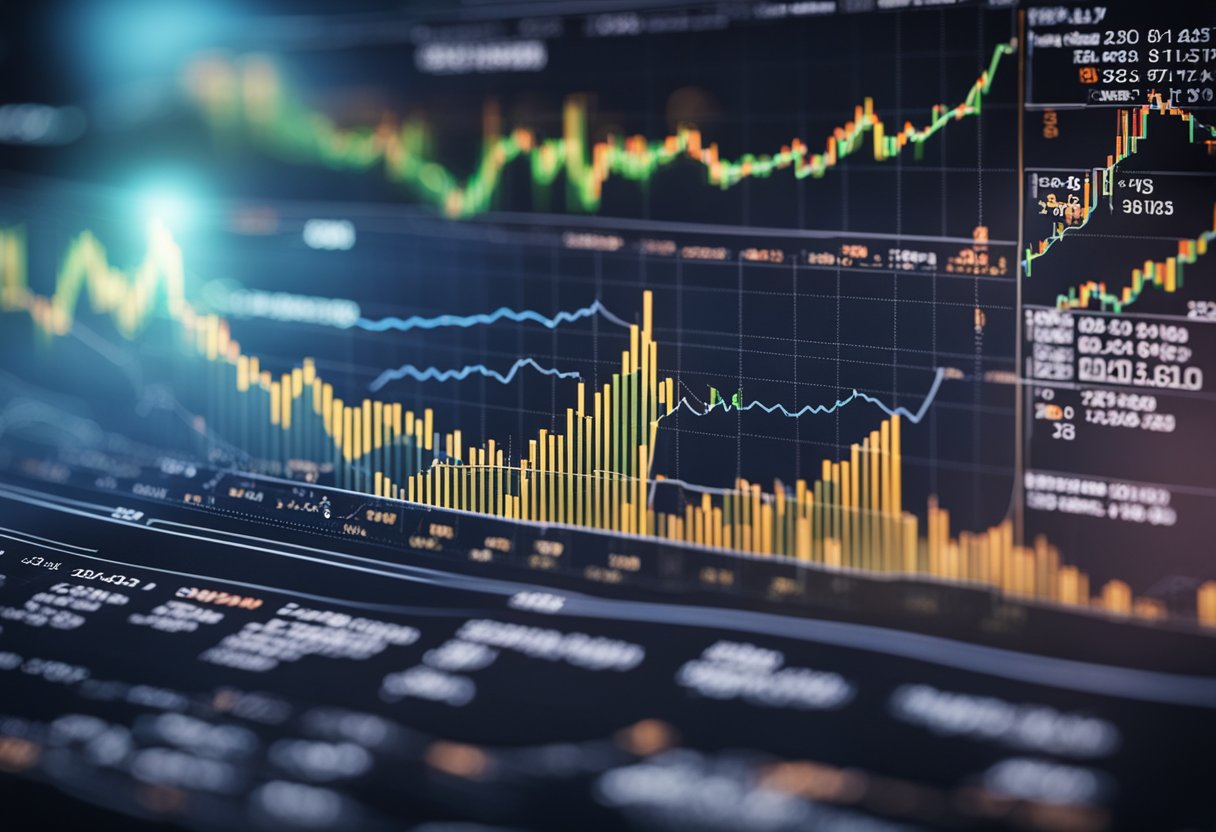Forex and CFD trading have become increasingly popular ways to invest in financial markets, with many people hoping to make a profit. However, the question remains: can you really make money with Forex and CFD trading? The answer is yes, but it’s not as simple as it may seem.

To make money with Forex and CFD trading, investors need to understand the market structure, choose a reliable broker, develop a profitable trading strategy, and manage risks effectively. It’s also important to have a good understanding of leverage and margin, as well as commission and spreads. Without these elements in place, investors may find it difficult to make consistent profits.
While it is possible to make money with Forex and CFD trading, it’s important to remember that there are significant risks involved. Investors should be prepared to put in the effort and dedication required to become a successful trader, and be aware of the common mistakes that can lead to losses. With the right knowledge and approach, however, it is possible to make a living from Forex and CFD trading.
Key Takeaways
- To make money with Forex and CFD trading, investors need to understand the market structure, choose a reliable broker, develop a profitable trading strategy, and manage risks effectively.
- Successful Forex and CFD trading requires effort, dedication, and a good understanding of the risks involved.
- While it is possible to make a living from Forex and CFD trading, investors should be aware of the common mistakes that can lead to losses.
Understanding Forex and CFD Trading

Forex and CFD trading are popular financial instruments that allow traders to speculate on the price movements of various underlying assets, including currency pairs, shares, indices, commodities, and more. Both Forex and CFD trading involve buying or selling an underlying asset at a certain price and profiting from the difference between the buying and selling price.
In Forex trading, traders buy or sell currency pairs, such as EUR/USD or GBP/USD, and speculate on their price movements. Forex trading is the largest financial market in the world, with daily trading volumes exceeding $5 trillion.
In CFD trading, traders buy or sell contracts for difference on various underlying assets, including Forex currency pairs. CFDs allow traders to speculate on the price movements of an underlying asset without actually owning it. Instead, traders own a contract that represents the value of the underlying asset.
One of the main advantages of Forex and CFD trading is the ability to trade on margin, which means that traders can trade with borrowed funds and magnify their potential profits. However, this also means that traders can incur significant losses if their trades go against them.
Forex and CFD trading involve a high degree of risk, and traders should only invest what they can afford to lose. It is also important to have a solid understanding of the markets and the financial instruments involved before trading.
In summary, Forex and CFD trading are popular financial instruments that allow traders to speculate on the price movements of various underlying assets. Both involve buying or selling an underlying asset and profiting from the difference between the buying and selling price. However, they differ in the type of underlying assets and the way traders own them. Traders should be aware of the risks involved and have a solid understanding of the markets and financial instruments before trading.
The Forex and CFD Market Structure

The Forex and CFD market structure is a decentralized market, meaning that it does not have a central exchange or physical location. Instead, it is a network of banks, financial institutions, and traders who buy and sell currencies, commodities, and other assets.
Forex, or foreign exchange, is the largest financial market in the world. It involves the trading of currencies, with the aim of profiting from changes in exchange rates. The market is open 24 hours a day, 5 days a week, and is traded globally.
CFD, or contract for difference, is a financial instrument that allows traders to speculate on the price movements of various assets, such as indices, commodities, and currencies, without actually owning the underlying asset.
The Forex and CFD market structure is characterized by high liquidity, which means that traders can buy and sell assets quickly and easily. This is due to the large number of participants in the market, including banks, financial institutions, and individual traders.
The exchange rate, which is the price at which one currency can be exchanged for another, is a key factor in the Forex and CFD market structure. Exchange rates are determined by supply and demand, and can be affected by a variety of factors, such as economic data, political events, and market sentiment.
In summary, the Forex and CFD market structure is a decentralized market, characterized by high liquidity and a large number of participants. It involves the trading of currencies, commodities, and other assets, with the aim of profiting from changes in exchange rates or price movements.
Choosing a Reliable Forex and CFD Broker
Choosing a reliable Forex and CFD broker is crucial for any trader looking to enter the world of currency and contract for difference (CFD) trading. With numerous brokers available in the market, it can be overwhelming to determine which one is trustworthy and best suited for your trading needs.
When choosing a broker, it is important to consider factors such as regulation, trading platforms, fees, customer service, and reputation. Here are some key points to keep in mind:
Regulation
Regulation is important because it ensures that brokers operate within a set of guidelines and standards designed to protect traders. In the UK, the Financial Conduct Authority (FCA) regulates Forex and CFD brokers, while in Australia, the Australian Securities and Investments Commission (ASIC) is the regulatory body.
Trading Platforms
Trading platforms are the software used to execute trades and access market data. A good trading platform should be user-friendly, reliable, and offer a range of tools and features to help traders make informed decisions. IG and Admiral Markets are two brokers that offer robust trading platforms.
Fees
Fees can have a significant impact on a trader’s profitability. Brokers may charge fees for spreads, commissions, overnight financing, and other services. It is important to compare fees across different brokers to ensure that you are getting a competitive rate.
Customer Service
Customer service is important because it can help traders resolve issues quickly and efficiently. Look for brokers that offer 24/7 support, multiple channels of communication, and knowledgeable representatives.
Reputation
A broker’s reputation is a reflection of its reliability and trustworthiness. Look for brokers with a strong track record and positive reviews from other traders. eToro is a well-known broker with a good reputation in the industry.
In summary, when choosing a Forex and CFD broker, it is important to consider regulation, trading platforms, fees, customer service, and reputation. By doing your research and taking the time to compare different brokers, you can find a reliable partner to help you achieve your trading goals.
Risk Management in Forex and CFD Trading
In Forex and CFD trading, risk management is essential to protect your capital and ensure long-term profitability. As with any investment, there are significant risks involved in trading Forex and CFDs, and traders must understand these risks before investing their money.
One of the most important risk management techniques in Forex and CFD trading is setting clear risk tolerance levels. Traders must determine their risk tolerance level before they start trading. This is the maximum amount of money a trader is willing to lose on a single trade or a series of trades. Once a trader has determined their risk tolerance level, they can set stop-loss orders to limit their losses.
A stop-loss order is an order placed with a broker to sell a security when it reaches a certain price. This order is used to limit a trader’s loss on a trade. For example, if a trader buys a currency pair at 1.2000 and sets a stop-loss order at 1.1900, the broker will automatically sell the currency pair if it falls to 1.1900. This ensures that the trader’s losses are limited to 100 pips.
Traders must also be aware of the high risk involved in Forex and CFD trading. These markets are highly volatile and can move rapidly in either direction. Traders must be prepared to accept significant losses if the market moves against them.
To manage risk effectively, traders must have a solid understanding of the markets they are trading in. They must be able to analyse market trends and make informed trading decisions. Traders must also be disciplined and stick to their trading plan. This means setting realistic profit targets and stop-loss levels and sticking to them.
Overall, risk management is a crucial aspect of Forex and CFD trading. Traders must understand the significant risks involved and take steps to protect their capital. By setting clear risk tolerance levels, using stop-loss orders, and being disciplined in their trading, traders can manage risk effectively and increase their chances of long-term profitability.
Developing a Profitable Forex and CFD Trading Strategy
Developing a profitable trading strategy is crucial for traders who want to make consistent profits in Forex and CFD trading. A trading strategy is a set of rules and guidelines that a trader follows to enter and exit trades. It helps traders to identify profitable opportunities and manage risks effectively.
There are two main types of trading strategies: technical analysis and fundamental analysis. Technical analysis involves analyzing charts and using technical indicators to identify trading opportunities. Fundamental analysis involves analyzing economic and financial data to predict market movements.
Traders should choose a trading strategy that suits their trading style, risk tolerance, and personality. A good trading strategy should be simple, flexible, and adaptable to changing market conditions.
Traders should also consider the following factors when developing a trading strategy:
- Profit targets: Traders should set realistic profit targets based on their risk-reward ratio. They should also use stop-loss orders to limit their losses.
- Risk management: Traders should manage their risks effectively by using appropriate position sizing, diversification, and risk-reward ratio.
- Trading plan: Traders should have a trading plan that outlines their entry and exit rules, risk management strategies, and profit targets.
- Backtesting: Traders should backtest their trading strategy using historical data to evaluate its performance and identify areas for improvement.
In addition to these factors, traders should also stay up-to-date with changing market conditions and adjust their trading strategy accordingly. They should also be disciplined and patient, and avoid emotional trading decisions.
In conclusion, developing a profitable trading strategy is essential for success in Forex and CFD trading. Traders should choose a strategy that suits their trading style and personality, and consider factors such as profit targets, risk management, trading plan, and backtesting. They should also stay up-to-date with changing market conditions and be disciplined and patient in their trading decisions.
Tools and Platforms for Forex and CFD Trading
When it comes to Forex and CFD trading, having access to the right tools and platforms can make all the difference. Here are some of the most popular options available:
Trading Platforms
A trading platform is the software that you use to place your trades and manage your account. Some of the most popular trading platforms for Forex and CFD trading include:
- MetaTrader 4 (MT4): This is one of the most widely used trading platforms, and it offers a range of features, including advanced charting tools, automated trading options, and more.
- MetaTrader 5 (MT5): This is the newer version of MT4, and it offers even more features, including more advanced charting tools and improved trading functionality.
- cTrader: This platform is known for its user-friendly interface and advanced charting tools, and it also offers a range of order types and execution modes.
Trading Apps
Trading apps allow you to manage your trades and monitor the markets from your mobile device. Some of the most popular trading apps for Forex and CFD trading include:
- eToro: This app offers a range of features, including social trading, copy trading, and more, and it is available for both iOS and Android devices.
- Plus500: This app offers a simplified trading experience, and it is available for both iOS and Android devices.
Demo Accounts
Demo accounts allow you to practice trading without risking any real money. This can be a great way to test out different strategies and get a feel for the markets. Some of the most popular platforms that offer demo accounts include:
- eToro: This platform offers a demo account that allows you to practice trading with virtual funds.
- Plus500: This platform also offers a demo account that allows you to practice trading with virtual funds.
Overall, there are a wide range of tools and platforms available for Forex and CFD trading, and it’s important to choose the ones that are right for you. Whether you’re looking for advanced charting tools, social trading features, or a user-friendly interface, there’s something out there to suit your needs.
Understanding Leverage and Margin in Forex and CFD Trading
Leverage and margin are two important concepts to understand in Forex and CFD trading. They allow traders to increase their market exposure with a smaller initial investment. However, they also increase the risk of losses, so it’s important to use them wisely.
Leverage
Leverage is the use of borrowed funds to increase the potential return of an investment. In Forex and CFD trading, it allows traders to control larger positions with a smaller amount of capital. For example, if a trader has a leverage of 100:1, they can control a position worth £100,000 with a deposit of just £1,000.
However, it’s important to note that leverage also magnifies the potential losses. If the market moves against the trader, they could lose more than their initial investment. Therefore, it’s important to use leverage wisely and to have a risk management strategy in place.
Margin
Margin is the amount of money a trader needs to deposit in order to open a position. It’s usually expressed as a percentage of the total value of the position. For example, if a trader wants to open a position worth £10,000 with a margin requirement of 2%, they would need to deposit £200.
Margin is used to cover any potential losses that may occur in the market. If the trader’s losses exceed their margin, they may receive a margin call from their broker, requiring them to deposit additional funds to cover their losses.
Leverage and Margin in Practice
Let’s say a trader wants to open a position worth £50,000 in the GBP/USD currency pair, with a leverage of 50:1 and a margin requirement of 2%. They would need to deposit £1,000 to open the position.
If the market moves in their favour and the position increases in value by 10%, the trader would make a profit of £5,000 (£50,000 x 10%). However, if the market moves against them and the position decreases in value by 10%, they would lose £5,000. If their losses exceed their margin, they would receive a margin call from their broker, requiring them to deposit additional funds to cover their losses.
In conclusion, leverage and margin are important concepts to understand in Forex and CFD trading. They allow traders to increase their market exposure with a smaller initial investment, but they also increase the risk of losses. It’s important to use them wisely and to have a risk management strategy in place.
Role of Research and Knowledge in Forex and CFD Trading
In order to potentially make money from Forex and CFD trading, it is important to have a deep understanding of the markets, trading strategies, and risk management techniques. This requires a commitment to research, education, and a willingness to constantly learn and adapt to changing market conditions.
One of the most important aspects of Forex and CFD trading is knowledge. Traders must have a solid understanding of the currency markets, including the factors that drive currency prices and the impact of economic, political, and social events on currency values. This requires a deep understanding of macroeconomic principles, as well as a familiarity with technical analysis and charting techniques.
In addition to knowledge, traders must also be committed to ongoing research and analysis. This includes keeping up-to-date with news and events that can affect currency values, as well as monitoring market trends and indicators. Traders should also be familiar with the various trading platforms and tools available to them, and should be comfortable using these tools to make informed trading decisions.
Another important aspect of Forex and CFD trading is trading education. Traders should seek out educational resources that can help them develop their skills and knowledge, such as online courses, webinars, and trading forums. These resources can provide valuable insights into trading strategies and risk management techniques, as well as help traders develop a routine for their trading activities.
Ultimately, successful Forex and CFD trading requires a combination of knowledge, research, and trading education. By committing to ongoing learning and development, traders can increase their chances of success in these dynamic and challenging markets.
Understanding Commission and Spreads in Forex and CFD Trading
Forex and CFD trading come with various costs, including commissions and spreads. Understanding these costs is crucial for traders to effectively manage their trading expenses and maximize their profits.
Commissions
Commissions are fees charged by brokers for executing trades. In Forex trading, commissions are usually calculated as a percentage of the trade’s value. For example, if a trader opens a trade worth £10,000 and the commission is 0.5%, the trader will pay £50 in commission.
In CFD trading, commissions can be calculated in different ways, such as a percentage of the trade’s value or a fixed fee per trade. Some brokers may also charge a commission for holding a position overnight.
Traders should pay attention to the commission rates charged by their brokers and choose a broker with competitive rates. However, it is important to note that low commissions do not always guarantee the best trading experience.
Spreads
Spreads are the difference between the bid and ask prices of a currency pair or other financial instrument. In Forex trading, spreads are usually measured in pips, which is the smallest unit of price movement in a currency pair.
In CFD trading, spreads can be measured in pips or as a percentage of the trade’s value. Some brokers may also offer fixed spreads, which do not change regardless of market conditions.
Traders should choose a broker with tight spreads, as wider spreads can significantly increase trading costs. However, it is important to note that some brokers may offer low spreads but charge higher commissions, so traders should consider both factors when choosing a broker.
Conclusion
Understanding commissions and spreads is essential for Forex and CFD traders to effectively manage their trading costs. Traders should choose a broker with competitive commission rates and tight spreads to maximize their profits. However, it is important to consider other factors such as the broker’s reputation, trading platform, and customer support when choosing a broker.
The Reality of Making Money with Forex and CFD Trading
Forex and CFD trading are popular investment options that offer the potential for high returns. However, the reality of making money with Forex and CFD trading is not as straightforward as some may think. It requires a significant amount of time, effort, and dedication to become a successful trader.
Making Money with Forex and CFD Trading
While it is possible to make money with Forex and CFD trading, it is important to note that it is a highly competitive and risky activity. The profitability of trading depends on a variety of factors, including market conditions, trading strategy, and risk management.
Can You Make a Living with Forex and CFD Trading?
Making a living from Forex and CFD trading is possible, but it requires a high level of skill and experience. Professional traders who make a living from trading have spent years honing their skills and developing a profitable trading strategy.
Becoming a Successful Forex Trader
To become a successful Forex trader, one must have a deep understanding of the market and the factors that affect it. Successful traders are disciplined and patient, and they have a well-defined trading plan that they stick to.
Profitability of Forex and CFD Trading
The profitability of Forex and CFD trading depends on a variety of factors, including market conditions, trading strategy, and risk management. It is important to have realistic expectations when it comes to profitability and to avoid chasing unrealistic goals and targets.
In conclusion, making money with Forex and CFD trading is possible, but it requires a significant amount of time, effort, and dedication. It is important to have realistic expectations and to approach trading with discipline and patience. By developing a profitable trading strategy and sticking to it, traders can increase their chances of success in the Forex and CFD markets.
Common Mistakes in Forex and CFD Trading
Making mistakes is a natural part of the learning process in Forex and CFD trading. However, it is essential to identify and avoid common mistakes that can lead to significant losses. Here are some of the most common mistakes traders make in Forex and CFD trading:
Lack of Discipline
One of the most common mistakes traders make is a lack of discipline. It is essential to have a well-defined trading plan and stick to it. Traders should have a clear understanding of their risk tolerance, trading objectives, and entry and exit points. Without discipline, traders may fall prey to their emotions and make impulsive decisions that can lead to significant losses.
Not Following a Trading Routine
Another common mistake traders make is not following a trading routine. A trading routine is a set of rules and guidelines that a trader follows to make trading decisions. It includes factors such as risk management, money management, defined entry and risk parameters, trading time frames, trading platforms, technical analysis or fundamental analysis, and which currency pairs to focus on. Without a trading routine, traders may lack consistency in their trading decisions, leading to poor performance.
Overtrading
Overtrading is a common mistake that many traders make. Overtrading occurs when a trader places too many trades, leading to increased transaction costs and reduced profitability. Overtrading can also lead to emotional exhaustion, which can impair a trader’s decision-making ability.
Lack of Education and Research
Not doing enough research and education is another common mistake traders make. Traders should have a good understanding of the market and the factors that affect it. They should also be aware of the trading tools available to them and how to use them effectively. Without sufficient education and research, traders may make poor trading decisions that can lead to significant losses.
In conclusion, Forex and CFD trading can be a lucrative venture if done correctly. However, traders must avoid common mistakes that can lead to significant losses. By having discipline, following a trading routine, avoiding overtrading, and conducting proper research and education, traders can increase their chances of success in Forex and CFD trading.
Frequently Asked Questions
What is the potential profit in Forex and CFD trading?
The potential profit in Forex and CFD trading varies depending on the market conditions and trading strategies employed. Forex and CFD trading offer high leverage, which means traders can control larger positions with a smaller amount of capital. However, this also means that the potential losses can be significant.
How much can I realistically earn from Forex and CFD trading?
It is difficult to determine how much a trader can realistically earn from Forex and CFD trading as it depends on various factors such as market conditions, trading strategies, and risk management techniques. However, it is important to note that Forex and CFD trading is not a get-rich-quick scheme, and traders should not expect to earn a substantial income overnight.
What are some strategies for making money with Forex and CFD trading?
There are various strategies for making money with Forex and CFD trading, including technical analysis, fundamental analysis, and price action trading. Traders should choose a strategy that suits their trading style and risk appetite. It is also important to have a solid understanding of the market and to use risk management techniques to minimize losses.
Can Forex and CFD trading provide a sustainable income?
Forex and CFD trading can provide a sustainable income for traders who have a sound trading plan, discipline, and risk management techniques. However, it is important to note that trading involves risks, and traders should not rely solely on Forex and CFD trading as a source of income.
What are the success rates of Forex and CFD traders?
The success rates of Forex and CFD traders vary, and it is difficult to determine an exact figure. However, it is estimated that only a small percentage of traders are consistently profitable, while the majority of traders experience losses. Successful traders typically have a solid trading plan, discipline, and risk management techniques.
What are the risks involved in Forex and CFD trading?
Forex and CFD trading involve risks such as market volatility, leverage, and counterparty risk. Traders should be aware of these risks and use risk management techniques to minimize losses. It is also important to have a solid understanding of the market and to keep up-to-date with economic and political news that can affect the markets.
Are forex trading bots profitable?
Forex trading bots, also known as automated trading systems, are designed to execute trades based on predefined rules and signals such as entry and exit points. They can be highly efficient and help maximise profits when combined with other trading strategies. However, their profitability is not guaranteed. Some bots have been extremely profitable, but they come with risks, including the potential to lose all your money just like a human trader. It’s crucial to find a reliable bot and understand how to use it properly. Therefore, while bots can be profitable, they also come with their own set of challenges and risks.
Are forex trading bots legal?
Forex trading bots are generally legal and have become a mainstay in forex trading. They are used in various markets including forex, stock markets, cryptocurrencies, and commodities. However, it’s essential to ensure that the bot you are using complies with the regulations and laws of the jurisdiction you are trading in.
Is forex trading worth it?
The worthiness of forex trading can be subjective and depends on various factors such as your trading strategy, risk tolerance, and market conditions. Automated trading bots can make the process more efficient and potentially profitable, but they also come with risks. Therefore, whether forex trading is worth it or not can depend on individual circumstances.
Can forex trading make you rich?
Forex trading has the potential to generate significant profits, but it also comes with high risks. Some traders have made substantial gains, but many others have incurred losses. Automated trading bots can assist in the trading process, but they are not a guaranteed path to riches. It’s essential to have a well-thought-out trading strategy and risk management plan.
Can forex trading be a career?
Forex trading can indeed be a career for some individuals. Many traders engage in forex trading full-time and make a living out of it. However, it requires a deep understanding of the forex market, a solid trading strategy, and effective risk management. Automated trading bots can assist but are not a substitute for human expertise and judgment.
Can I trade forex for free?
While you can open demo accounts for free to practice forex trading, real trading involves costs such as spreads and commissions. Some brokers offer no-commission trading, but they might make money through wider spreads. Therefore, while you can start for free, actual trading will have associated costs.





